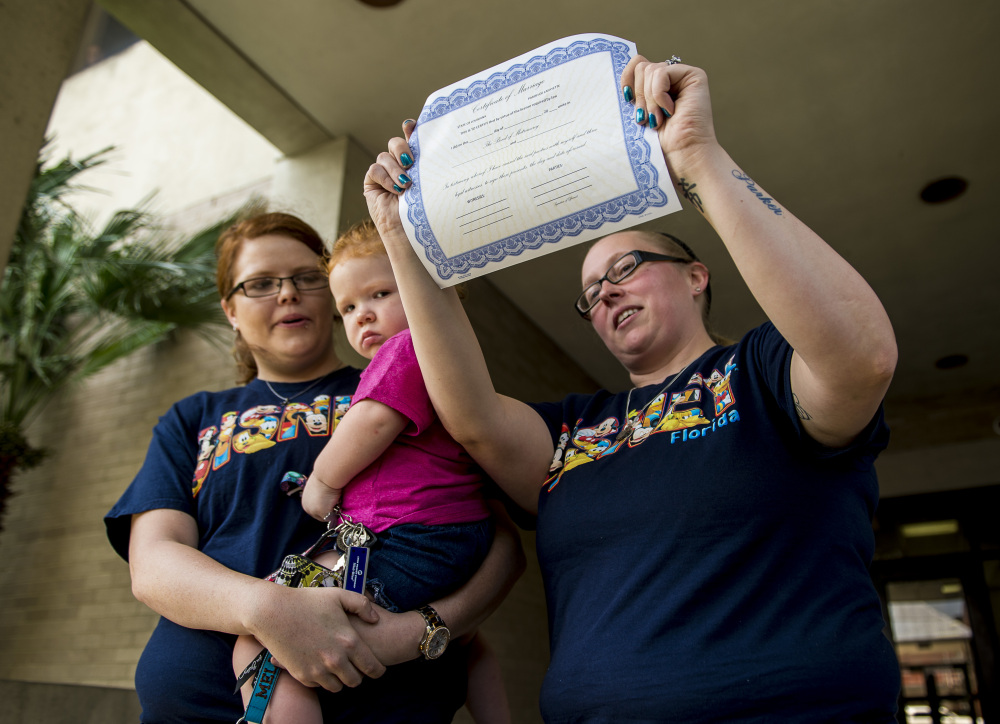County clerks across the South began issuing marriage licenses to same-sex couples Monday, as state leaders suggested that they would reluctantly follow the law while seeking to protect the religious liberties of county workers who oppose such unions.
Gay couples reported receiving marriage licenses in parts of Louisiana and Mississippi, the two holdouts among the 14 states that before Friday’s U.S. Supreme Court ruling had not allowed same-sex couples to legally marry.
In Alabama, many county officials were granting licenses to gay couples, despite the state’s firebrand chief justice, Roy Moore, telling them that they were to hold off for 25 days. And a large number of Texas’ 254 counties were either issuing marriage licenses to same-sex couples Monday or indicated that they will do so soon, said Chuck Smith, executive director of Equality Texas, an advocacy group.
“We’re very pleased to see that clerks are recognizing the freedom to marry is the law of the land,” he said.
But many counties across the region said they were not ready to comply with the Supreme Court ruling that declared marriage a constitutional right for all Americans, with at least some waiting for firmer guidance from their state attorneys general. And some state leaders advised county officials that they may opt out of their duties if they have a religious objection to same-sex marriage.
Among those officials were Texas Attorney General Ken Paxton, a Republican, who on Sunday called the Supreme Court ruling a “lawless decision” and pledged to assist clerks who face legal challenges. Late Monday, a legal adviser to Republican Louisiana Gov. Bobby Jindal offered similar guidance.
“Appropriate accommodations may be made for state employees who express a religious objection to involvement in issuance of same-sex marriage licenses, and judges and justices of the peace may not be forced to officiate a same-sex wedding ceremony when other authorized individuals who have no religious objection are available,” Thomas Enright, executive counsel to the governor, said in a memo.
The situation was different in Mississippi, where Attorney General Jim Hood, a Democrat, had informed county officials last week that same-sex marriage was not technically permitted in the state until a lower court confirmed the ruling. But on Monday, he sent an email to clerks clarifying that there would be “no adverse action” if they issued same-sex marriage licenses.
By Monday afternoon, it became clear that the question of religious liberties – and whether county officials are permitted to opt out of their duties because of their faith – will be a central issue going forward.
Several experts said it is unlikely that a clerk would be legally permitted to opt out of same-sex marriage services.
“I’m aware of no general legal doctrine or precedent holding that county or other public officials are exempt from abiding by rights articulated by the Supreme Court in the event the religious beliefs of those public employees are in conflict with the federal right,” said Daniel Pinello, a professor at the John Jay College of Criminal Justice in New York.
But some religious conservatives argued that support of same-sex marriage cannot be a prerequisite for these jobs, particularly when these officials are elected.
“If we come to the point where you can’t run for public office (because) you have to do something that goes against your convictions, what that’s saying is that Christians no longer have a right to serve in public office, and I think that’s wrong,” said Joe Godfrey, executive director of the Alabama Citizens Action Program.
For many of the clerks who started issuing marriage licenses to same-sex couples Monday, the reason was practical. Jon Gegenheimer, the clerk in Jefferson Parish, Louisiana, next door to New Orleans, said he and his attorney reviewed the ruling over the weekend and decided early Monday morning that they would issue the licenses.
“We made the decision based strictly on an unemotional and rational basis, and we didn’t consider religion or anything like that,” said Gegenheimer, who declined to reveal his beliefs about same-sex marriage. “Based upon careful examination of the Supreme Court’s opinion, my counsel and I concluded that the order is definitive, so it should be implemented without delay.”
Send questions/comments to the editors.



Success. Please wait for the page to reload. If the page does not reload within 5 seconds, please refresh the page.
Enter your email and password to access comments.
Hi, to comment on stories you must . This profile is in addition to your subscription and website login.
Already have a commenting profile? .
Invalid username/password.
Please check your email to confirm and complete your registration.
Only subscribers are eligible to post comments. Please subscribe or login first for digital access. Here’s why.
Use the form below to reset your password. When you've submitted your account email, we will send an email with a reset code.